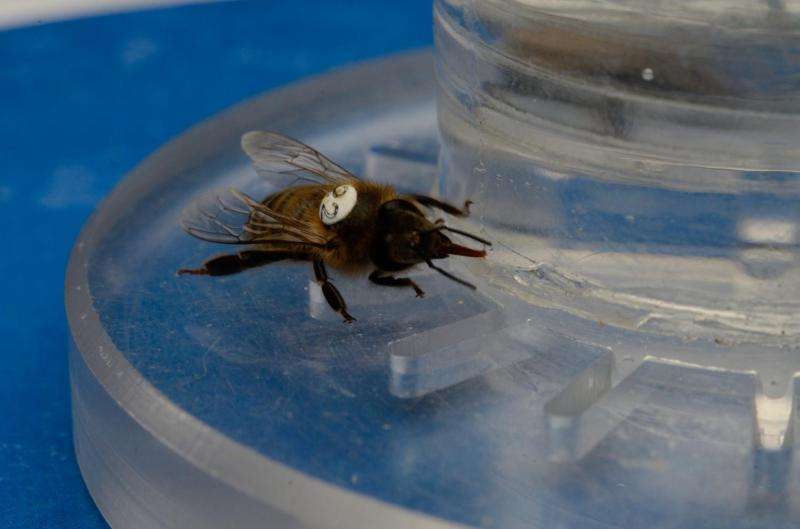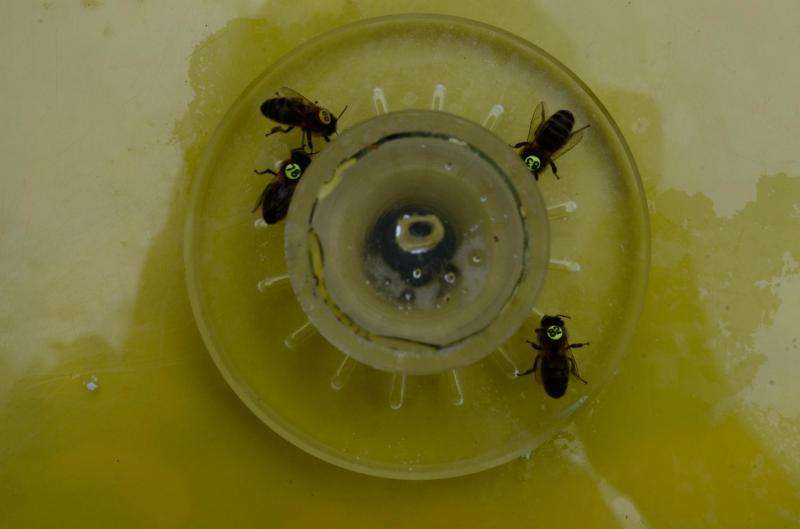Buzzing bees can't resist caffeinated nectar

For many people, the best start to the day is a nice, fresh cup of joe. Now, researchers reporting in the Cell Press journal Current Biology on October 15 find that honey bees find caffeinated beverages—er, nectar—irresistible too.
In fact, it appears that bees may select caffeinated nectar over an uncaffeinated but otherwise equal-quality alternative. As a result, the researchers say, plants may be lacing their nectar with caffeine as a way to pass off cheaper goods.
"We describe a novel way in which some plants, through the action of a secondary compound like caffeine that is present in nectar, may be tricking the honey bee by securing loyal and faithful foraging and recruitment behaviors, perhaps without providing the best quality forage," says Margaret Couvillon of the University of Sussex.
"The effect of caffeine is akin to drugging, where the honey bees are tricked into valuing the forage as a higher quality than it really is," adds Roger Schürch, of the University of Sussex and the University of Bern. "The duped pollinators forage and recruit accordingly."
Couvillon, Schürch, and their colleagues were aware of earlier studies, which found that honey bees are better at learning and remembering particular scents when they are under the influence of caffeine. The findings suggested a role for reward pathways in the bees' brains.
"I could not help but wonder how caffeine would affect the natural behaviors as seen in the field," Couvillon says, noting that the nectar of many flowering plants contains caffeine in low concentrations.

To investigate, the researchers tested bees' responses to a sucrose solution with field-realistic doses of caffeine or without. They found that the caffeine caused honey bees to forage more and to direct their friends to the caffeinated forage more frequently with waggle dances. The caffeine quadrupled the recruitment dances of bees to those feeders in comparison to uncaffeinated controls.
Bees were more persistent about returning to sites where they'd previously found caffeinated nectar, even after the feeder had run dry. After sipping caffeine, bees were also less inclined to search for other resources, a behavior that could be useful when the well runs dry.
"We were surprised at how, across the board, we saw an effect of caffeine just about everywhere we looked in foraging and recruitment, and all in the direction to make the colony more faithful to the caffeinated source compared to an equal-quality, uncaffeinated source," Schürch says.
Based on their observations of the individual bees' behaviors, the researchers' model suggests that caffeinated nectar could reduce honey production in colonies if indeed plants reduce the sweetness of their nectar. The findings come as a reminder that the interests of plants and their pollinators don't always align.
The researchers say it would now be interesting to find out whether plants that lace their nectar with a secondary compound like caffeine also make nectar that's less sweet. And, they note, caffeine isn't the only secondary compound found in nectar.
"It would be interesting to determine the effects of other compounds," Couvillon says. "It may be that chemistry is a popular way in which plants can get the upper hand on their pollinators."
More information: Current Biology, Couvillon et al.: "Buzzing bees: caffeinated forage tricks honey bees into increasing foraging and recruitment behaviors" dx.doi.org/10.1016/j.cub.2015.08.052
Journal information: Current Biology
Provided by Cell Press





















